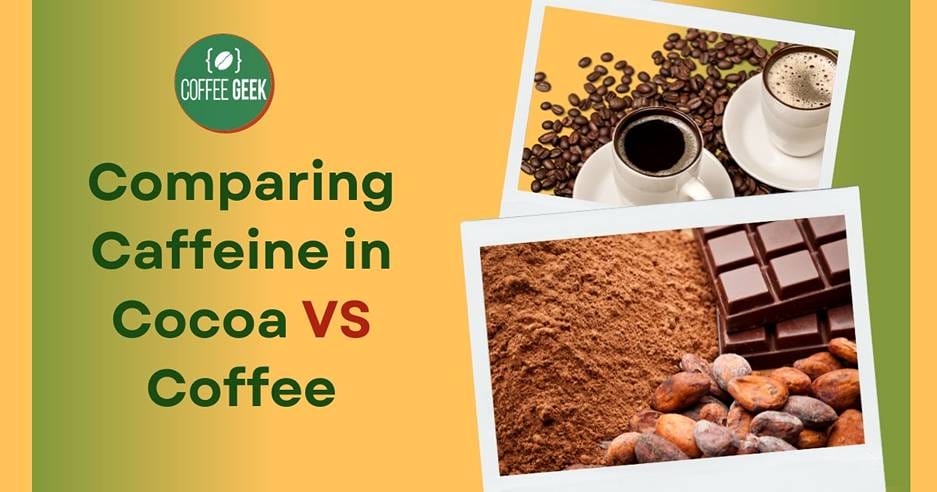Ever had one of those days where you’re craving that caffeine kick, but can’t decide whether to go for a comforting cup of hot chocolate or an invigorating cup of coffee?
Well, put your feet up and cast those bewildered eyes over here, my dear readers, because we’re about to deep dive into the nitty-gritty, comparing the caffeine in cocoa and coffee in a friendly, quirky, and dare I say, caffeinated debate.
Brace yourselves; it’s going to be a rich blend of fun facts and funny quips on caffeine in cocoa vs coffee.
What is the Caffeine Content in Chocolate and Hot Chocolate?
Understanding Caffeine Amounts in Different Types of Chocolate
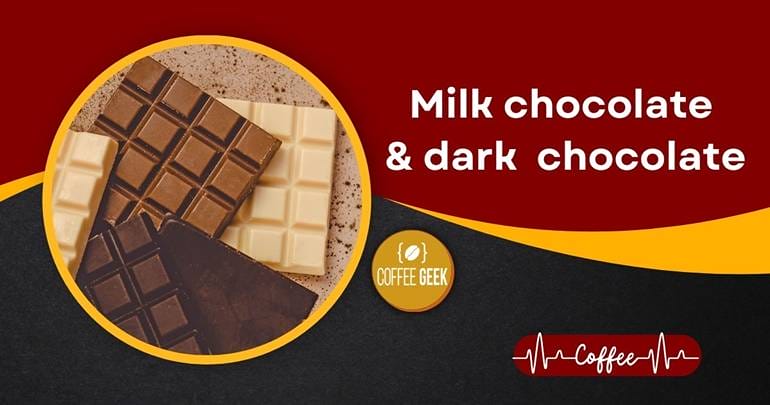
Ah, chocolate! But how much caffeine does chocolate contain?
Your good ol’ milk chocolate, being a divine combination of cocoa solids, cocoa butter, and sugar, has less caffeine than its sophisticated cousin, the dark chocolate.
A piece of dark chocolate can pack nearly twice as much caffeine, depending on the amount of cocoa it contains.
Some dark chocolate bars are like chocolate-based espresso shots, with as many as 70+ milligrams of caffeine per serving!
Caffeine in Hot Chocolate: How Much is There?
Next on our caffeine-intense journey, let’s take a pit stop at Hot Chocolate town. How much caffeine is in that comforting cup of hot chocolate you clutch in your trembling, caffeine-craving hands?
Let’s crack this nut: a typical cup of hot chocolate contains about 5-15 mg of caffeine per serving. Not a mountain, but not a molehill either!
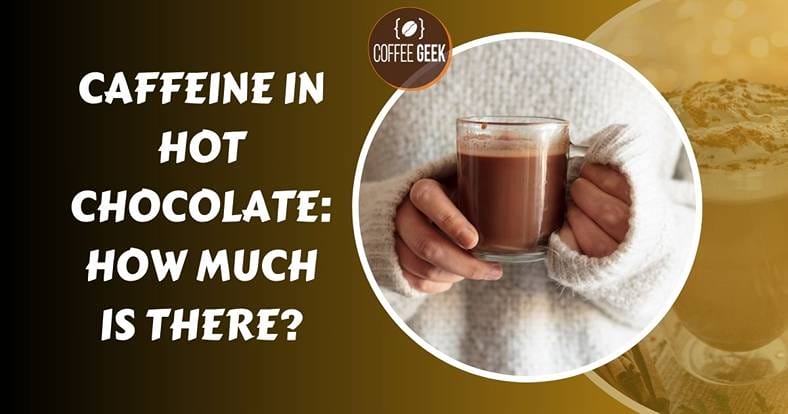
Does Cocoa Powder Contain Caffeine?
Straight to the powder keg, eh? Well, cocoa powder, the raw, unadulterated soul of your hot cocoa does, indeed, contain caffeine.
And depending on how it is processed, caffeine in cocoa powder can range from a meager 12mg to a robust 230mg per 100g. So, yes, your hot cocoa is sneakily caffeinated!
How Much Caffeine is in Your Tea and Coffee?
Decoding the Caffeine Content in a Cup of Coffee
Now, let’s venture into the dense and aromatic forest of coffee beans. A typical 8-ounce cup of coffee contains a whopping 95 mg of caffeine, a veritable breakfast beast compared to cocoa.
It’s like a punch of energy wielding coffee gloves, ready to knock out your sleepiness!
Tea VS Coffee: Which has More Caffeine?
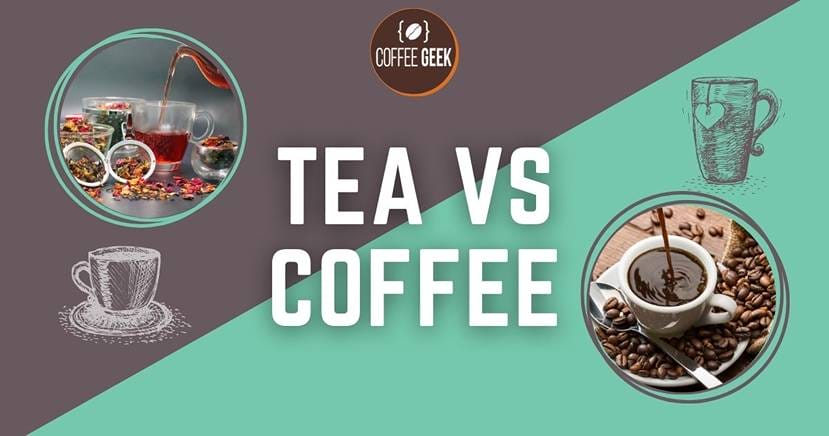
While we’re on the topic of caffeinated showdowns, let’s not leave out the tea leaves from the caffeine in coffee vs tea match.
Although tea leaves tend to have more caffeine per weight than beans, once brewed, your cup of tea boasts less caffeine than coffee.
On average, a cup of black tea has about 47mg of caffeine, less than half the amount in coffee, making it the safe middle ground for our caffeine sensitive friends.
Comparing the Caffeine in Decaf Coffee, Regular Coffee and Black Tea
Decaf coffee… the way coffee says, “Take it easy” without losing its classic taste. A typical cup of decaf has about 2 to 5 mg of caffeine per cup.
That’s considerably less caffeine than regular coffee and even black tea, making it the chill cousin in this caffeine-tight family.
Caffeine in Cocoa vs Coffee
Comparing a Cup of Hot Chocolate and a Cup of Coffee: Caffeine Amounts
Are you a coffee vs hot chocolate debater? Let’s address the caffeine content once and for all.
While hot chocolate contains about 5-15 mg, remember that the coffee is still keeping its crown with about 95 mg of caffeine per cup, making it a clear winner in terms of caffeine levels.
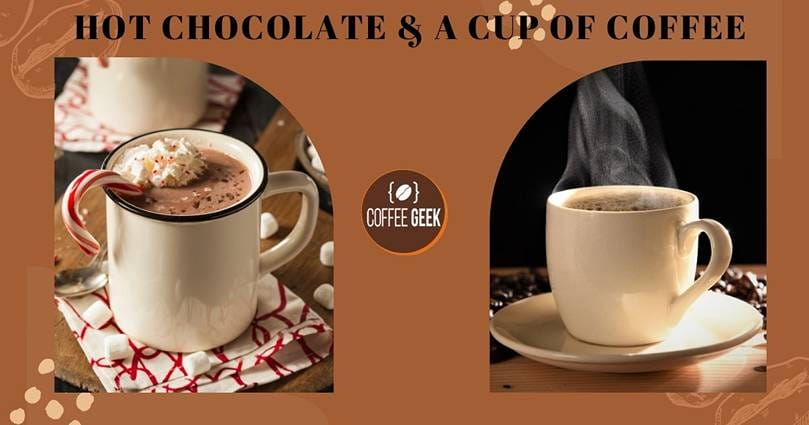
Dark Chocolate and Coffee: A Closer Look at Their Caffeine Levels
Dark chocolate, the dawn of the chocolate world, is higher in caffeine compared to its milkier counterparts.
With a maximum of 70mg or more of caffeine in a bar, it still falls short of the caffeine in a cup of coffee which pumps up your system with about 95 mg of powerhouse caffeine.
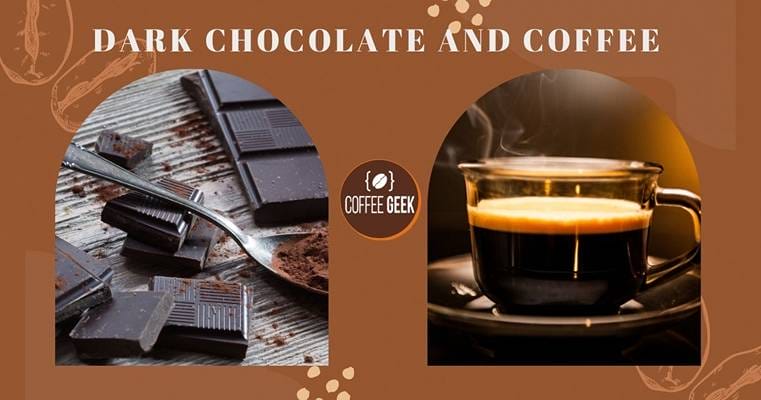
To Chocolate or To Coffee: Which Increases Your Caffeine Intake More?
Caught between coffee and chocolate, wondering what could set off your caffeine intake more?
Your caffeine levels would be higher with coffee, but remember, a delicious dark chocolate can provide a nice caffeine fix too.
But remember, if you’re sensitive to caffeine, going light on both coffee and chocolate might just save your sleep.
Understanding the Impact of Caffeine from Coffee and Chocolate
How Does the Caffeine from Coffee Affect Your Body?
A warm cup of coffee feels like a rejuvenating hug in the morning, doesn’t it?
While the caffeine ‘kur-pow!’ from coffee acts as a stimulant, keeping you alert, it can also increase gastrointestinal activity and heart rate.
So go ahead, celebrate that morning ritual but remember, too much of a good thing…
Effects of Caffeine from Chocolate: Is it as Stimulating as Coffee?
Chocolate caffeine, while less potent than coffee, nonetheless hits those feel-good buttons due to other compounds it contains, like theobromine and phenethylamine.
So, the caffeine in chocolate won’t kick-start your morning like coffee, but it will certainly brighten your day.
Maximizing the Benefits and Minimizing the Risks of Caffeine Intake
In the heady hustle-bustle of our caffeinated world, it’s important to remember balance.
While caffeine is a naturally occurring stimulant, it’s important to be mindful of intake, especially if you’re sensitive to caffeine.
So, enjoy your coffee and chocolate but remember, nothing works like a bit of moderation.
Coffee and Chocolate: A Tale of Two Caffeinated Delights
The Role of Coffee Beans and Cocoa Solids in Caffeine Content
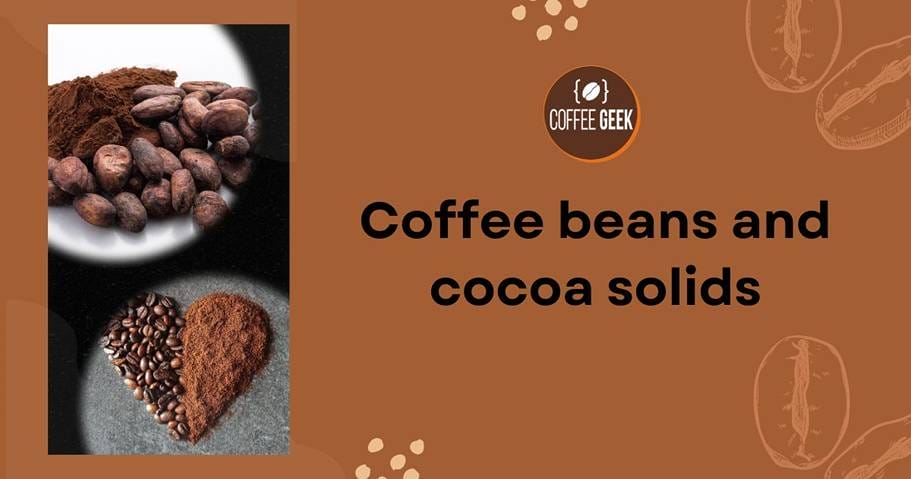
Coffee beans and cocoa solids play the lead role in our caffeinated story, defining every cup of coffee and block of chocolate.
As the caffeine in coffee is naturally higher than in cocoa, coffee players, take a bow!
But let’s not forget the comforting, velvety charm of cocoa solids in hot chocolate and their gentle touch of caffeine as well.
Hot Cocoa VS Coffee: A Battle of Comfort Drinks
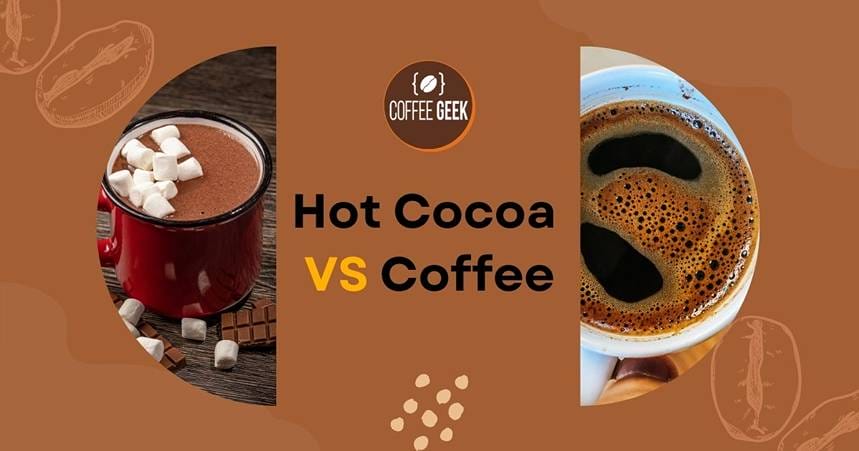
On one side, we have hot cocoa, the comforting warm blanket of drinks, and on the other, coffee, the spirited morning kick-start.
Despite being comparatively low in caffeine, hot cocoa doesn’t surrender its flag of comfort easily, ultimately leaving it up to you to make the caffeine pick for the day.
Milk Chocolate VS Coffee: Do They Have Similar Caffeine Levels?
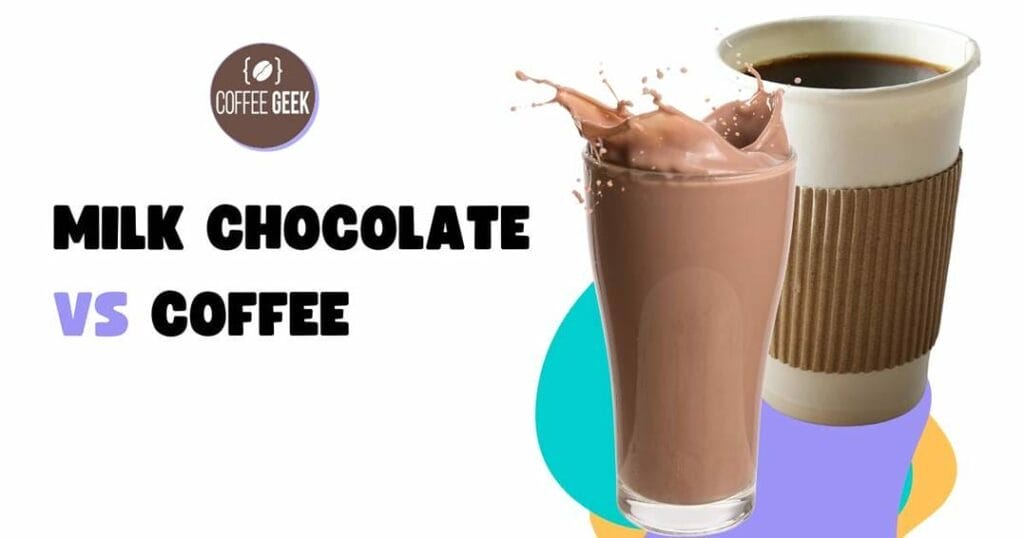
In the final bout between milk chocolate and coffee, we see that the caffeine levels are not quite similar. Coffee, with its naturally high caffeine content, stands triumphant in this caffeine ring.
However, fear not, milk chocolate lovers, remember in taste if not in caffeine, milk chocolate holds its own, and we wouldn’t have it any other way!
In Summary
When comparing the caffeine content in cocoa and coffee, it’s essential to understand that both offer different levels of caffeine.
Chocolate is made from cocoa, and while it does contain caffeine, the amount is considerably less than what’s caffeine found in coffee and tea.
For instance, one 6-ounce cup of hot chocolate contains 25 milligrams of caffeine – approximately, which is significantly lower compared to coffee.
To put this into perspective, the average caffeine content in a similar serving of coffee can be much higher.
For example, a standard cup of brewed coffee can contain about 155 mg of caffeine, and some stronger varieties like a cup of Starbucks’ hot chocolate can go up to 360 mg of caffeine.
This shows that coffee also has one of the highest caffeine levels among popular beverages.
| Beverage | Caffeine Content (per 8 oz/240 mL) |
|---|---|
| Coffee (brewed) | 95 mg |
| Coffee (espresso) | 63 mg |
| Cocoa (hot cocoa) | 5 mg |
| Cocoa (dark chocolate) | 12 mg (per 1 oz/28 g) |
In contrast, hot chocolate depends more on the chocolate’s caffeine content, which is naturally lower than that of coffee beans.
The caffeine in hot chocolate vs. coffee offers a clear comparison: while both beverages contain caffeine, coffee has a substantially higher amount.
Even decaf coffee contains some caffeine, though in much lower quantities, typically less than 5 mg per serving, but it does contain any caffeine, unlike some other decaffeinated beverages.
Chocolate also contains caffeine, but the amount is only a fraction of what is found in coffee.
For example, compared to coffee, hot chocolate is often seen as a milder option for those who like chocolate but want to avoid high levels of caffeine.
However, it’s important to note that caffeine content can vary based on the brand and preparation method.
In summary, while both cocoa and coffee contain caffeine, the levels of caffeine in cocoa products like hot chocolate are much lower than in coffee.
Coffee, especially types like Starbucks’ hot chocolate, can have twice the caffeine content or more compared to a standard cup of hot chocolate.
This difference makes hot chocolate a more suitable option for those seeking to enjoy a warm, comforting drink with lower caffeine content.
People Also Ask
What is the average amount of caffeine in coffee vs caffeine in cocoa powder?
On average, an 8-ounce cup of brewed coffee can have anywhere from 95 to 200 milligrams of caffeine.
On the other hand, a tablespoon of cocoa powder used in making chocolate contains around 12 milligrams of caffeine.
It’s worth noting that the caffeine content in coffee and even more so in chocolate depends on various factors, including the type of coffee or cocoa beans used, the way they are prepared, and the type of drink made.
Does chocolate caffeine amount vary?
Yes, the amount of caffeine in chocolate depends on various factors. The type of chocolate matters: for example, dark chocolate contains more caffeine compared to milk or white chocolate.
The way chocolate is made, especially if it’s made from cocoa beans right from scratch, may also influence its caffeine level.
What are the caffeine levels in decaffeinated coffee?
Even though it’s called “decaffeinated,” decaf coffee does still contain some caffeine.
A cup of decaf coffee typically contains between 2 and 15 milligrams of caffeine, depending on the coffee type and the decaffeination process used. This is significantly lower caffeine content compared to regular coffee.
What contains the most caffeine, coffee or cocoa?
Generally, coffee contains the most caffeine. While the exact amount can vary based on the coffee type and brewing process, even a light-roast coffee typically has more caffeine than cocoa or chocolate made from cocoa beans.
It’s worth noting that excessive caffeine consumption can have health implications, so it’s recommended to limit your daily intake to around 400 mg of caffeine per day, which is about the amount found in 4 cups of brewed coffee.
How much caffeine is there in white chocolate?
White chocolate contains minimal to no caffeine. This is because it’s made mostly from cocoa butter, sugar, and milk solids, and doesn’t contain cocoa solids which have the caffeine.
So if you’re trying to reduce your caffeine intake but still want to enjoy a treat, white chocolate is an excellent choice.
Is hot chocolate made from cocoa beans high in caffeine?
The amount of caffeine in hot chocolate made from cocoa beans is moderate.
Typically, a 6-ounce cup of hot chocolate contains about 5 to 25 milligrams of caffeine depending on the cocoa content in the hot chocolate mix.
How does the amount of caffeine in chocolate vs coffee compare?
Generally, the amount of caffeine in coffee is much higher than in chocolate.
An average cup of brewed coffee contains about 95 to 200 milligrams of caffeine, while an average piece of chocolate only contains around 12 milligrams.
Both are excellent sources of caffeine, but if you’re looking for a stronger kick, coffee is usually the way to go.
Does tea contain less caffeine than coffee?
Generally, a cup of tea contains less caffeine than a cup of coffee.
For instance, an 8-ounce cup of brewed coffee generally contains about 95 to 200 milligrams of caffeine, while a cup of black tea has around 40 to 70 milligrams.
However, the amount can differ vastly depending on the type of coffee or tea and the brewing process.
Is there a difference in caffeine between dark and milk chocolate?
Dark chocolate generally contains more caffeine than milk chocolate.
On average, dark chocolate contains about 12 milligrams of caffeine per ounce, while milk chocolate contains about 9 milligrams per ounce.
Dark chocolate has a higher percentage of cocoa solids, which is where the caffeine is found.
How can I lower my caffeine intake from coffee and chocolate?
There are several ways to reduce your caffeine intake. You could limit your consumption of high-caffeine products like coffee and dark chocolate.
Opting for milk or white chocolate, coffee alternatives like herbal tea, or switching to decaf coffee can also help.
Remember, it’s generally recommended to limit caffeine intake to no more than 400 mg of caffeine per day, about the amount in 4 cups of brewed coffee.

